
The vaccination calendar will help parents find out the timing of the immunization and the name of the vaccine that will be introduced to the child in the clinic.
The content of the article
- Russian vaccination calendar: list of vaccinations
- What do parents need to know about vaccinations and vaccination of children?
- Vaccination calendar: table
- Russian vaccination calendar for children under 1 year
- List of vaccinations up to 2 years
- Russian vaccination calendar for children under 3 years old
- Mandatory vaccinations for children
- Calendar of vaccination Kazakhstan
- Vaccination calendar Ukraine year
- Is there a new vaccination in the vaccination calendar?
- Video: Actions after vaccination - School of Dr. Komarovsky
The calendar of the professional defense system, which operates in the territory of the Russian Federation, is one of the most complete, when compared with other countries of the world
- If we analyze the scheme of profile defense systems this year and past years, you can see what innovations have been introduced
- This year new vaccines have appeared, which are given great attention, for example, vaccinations against viral hepatitis
- The schematic table of vaccinations is mandatory for use in each region of Russia. Exceptions can be areas with a complex epidemic support
Russian vaccination calendar: list of vaccinations
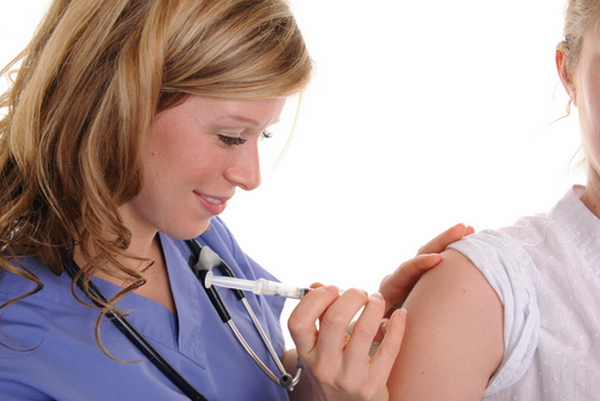
Russian vaccination calendar: list of vaccinations
- Each year, the schematic table of immunization is reviewed by specialists of the Ministry of Health and approved by the main doctors of the country
- Responsible work of medical personnel is carried out, which changes the terms of vaccines, taking into account the reality of the epidemiological station in the country
Important: all changes are applied in practice. Parents are obliged to observe the vaccination calendar if they want their child to grow up with a healthy and handsome person.
The calendar of vaccination of the Russian year is no exception. It was taken into account the most difficult forecasts for identifying the number of people who are carriers of dangerous bacteria.
The list of vaccinations in Russia, which children need to be made before adulthood are also approved annually. In the hospital, kindergartens, schools and universities, children are vaccinated from such diseases:
- Viral hepatitis B.
- Tuberculosis
- Diphtheria, pertress and tetanus
- Hemophilic infection
- Polio
- Cores, rubella, epidemic mumps
- Flu
What do parents need to know about vaccinations and vaccination of children?
- Before making an injection to their child, parents should know about the benefits of the immunization process
- Vaccination is produced only to a healthy baby. He should not have contraindications to the introduction of a particular vaccine, for example, allergies to egg protein
- The doctor must notify his parents about the consequences that may appear after the injection
What else do mothers and dads need to know about vaccinations and vaccination of children can be read in this article.
Remember: immunization of children helps to reduce the number of severe infections! After the injection, children's immunity produces antibodies that allow you to deal with the pathogens of infectious diseases if they enter the child's body.
Vaccination calendar: table
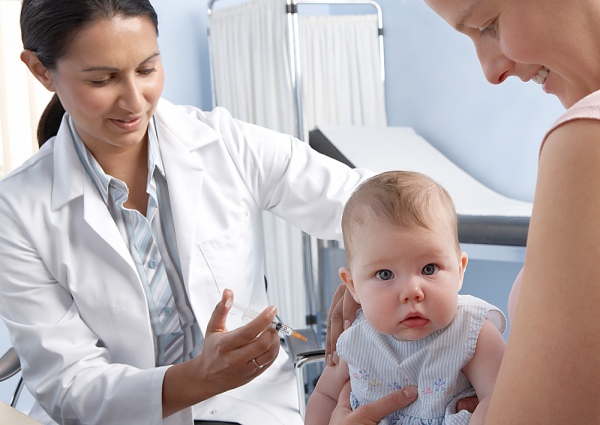
Vaccination calendar: table
- The work of children's clinics is currently focusing on mass immunization
- However, mothers and dads should sign permission to introduce an injection in the clinic - at a doctor’s appointment, or at home, if vaccination is carried out in an educational institution
- Below is a table with a vaccination calendar. It is convenient to use it, and every mother will know when her baby needs to carry out another immunization
Garrow calendar table
| Age group of children subject to conducting vocational impacts | Name of immunization |
On the basis of which documents are vaccinated |
| Newborn children in the first 24 hours after the birth | The first immunization from viral hepatitis in | It is carried out by all children according to the instructions, including children from risk groups: if the mother is the bearer of the hepatitis B virus or transferred this disease in the third trimester of pregnancy; If the mother did not provide the results of the examination on the markers of hepatitis B to the maternity ward; If a child has drug addicts who are carriers of viral hepatitis B and chronic hepatitis |
| Newborns 3-7 days of birth | Immunization against tuberculosis | Sparing the first immunization - special vaccines are used to prevent this disease |
| Children in 1 month | The second immunization against hepatitis in | It is carried out to all children, including children from risk groups |
| Children at 2 months old | The third stage of immunization against hepatitis in | All kids are carried out, including children from the risk group |
| Children at 3 months old | The first stage of immunization against diphtheria, pertress and tetanus | All kids of this age are carried out |
| Children from 3 to 6 months | The first stage of immunization against hemophilic infection | Children are carried out that belong to risk groups: if the child has an immunodeficiency state or certain anatomical defects that lead to the danger of the disease with this infection; if the child has oncgetological disease; HIV-infected children and children born of HIV-infected mothers; Children who are in specialized boarding schools of a closed type or health facilities. |
| Children at 4.5 months old |
The first stage of immunization against poliomyelitis The second stage of immunization against diphtheria, pertress and tetanus The second stage of immunization against hemophilic infection The second stage of immunization against poliomyelitis |
All these vaccinations are carried out according to the instructions for the children of this age group |
| Children at 6 months old |
The third stage of immunization against diphtheria, pertress and tetanus The third stage of immunization against viral hepatitis in The third stage of immunization against hemophilic infection The third stage of immunization against poliomyelitis |
These vaccinations are carried out for children of this age group who received vaccination in planned mode |
| Children at 12 months old |
Immunization against measles, rubella, epidemic mumps The fourth stage of immunization against hepatitis in |
Vaccination is carried out in accordance with the approved instruction |
| Children at 18 months |
The first revaccinated stage against diphtheria, pertress and tetanus The first revaccinated stage from poliomyelitis Revaccinated stage from hemophilic infection |
Vaccinations are carried out by children according to the instructions for the prevention of these diseases of this age group |
| Children at 20 months | The second stage of immunization from poliomyelitis | It is carried out on the basis of prescriptions |
| Children at 6 years old | The revaccinated stage from measles, rubella and epidemic mumps | Carried out on the basis of instructions for this age group |
| Children 6-7 years old | The second revaccinated stage from diphtheria and tetanus | It is carried out on the basis of instructions for the use of anatoxins with the minimum content of antigens to children of this age |
| Children at 7 years old | Revaccinated stage against tuberculosis | Previously, the child is performed by the Mantoux reaction. If the result is negative, this revaccination is carried out in accordance with the instructions for children of this age |
| Children at the age of 14 |
The third revaccinated stage from diphtheria and tetanus The third revaccinated stage against poliomyelitis |
It is carried out on the basis of instructions for the use of vaccines for children of this age |
| Adult children at the age of 18 |
Revaccinated stage from tuberculosis Revaccinated stage from diphtheria and tetanus |
Tuberculin -negative children of this age are carried out It is carried out on the basis of instructions for use every 10 years from the moment of the last vaccination |
| Children from 1 year to 18 years old | Immunization from viral hepatitis in | Conducting in accordance with the instructions: the first dose at the time of the start of vaccination, the second dose is a month later, the third dose 5 months after the introduction of the second dose |
| Children from 1 to 18 years old | Immunization against rubella | It is carried out for children who did not hurt this disease, were not vaccinated earlier, and girls from 18 to 25 years old (not painted and not vaccinated earlier) |
| Children from 6 months old, school students and university students | Influenza immunization | Conducting on the basis of instructions for use |
| Children at 15-17 years old | Core immunization | It is carried out on the basis of instructions for use by children who did not hurt this disease and were not vaccinated earlier |
Important: Vaccines can be introduced (except for vaccinations from tuberculosis), if necessary, in one trick, but with different syringes. If the immunization time is violated, then vaccination is carried out according to new schemes that are registered in the national vaccination calendar.
To the attention of parents: Immunization occurs using special medications that are registered in the Ministry of Health.
Russian vaccination calendar for children under 1 year
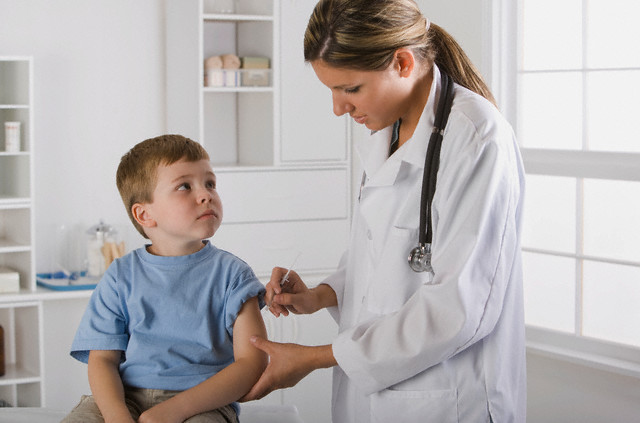
Russian vaccination calendar for children under 1 year
Many mothers and dads believe that small babies are prescribed a large number of injections in order to improve immunization. After all, up to a year of the child is vaccinated almost every month.
The full calendar of vaccination of Russia for children under 1 year consists of such vaccination:
- Against viral hepatitis
- Against tuberculosis
- Against diphtheria, pertress and tetanus
- Against hemophilic infection (if there are indications for such vaccination)
- Against polio
- Against rubella, epidemic mumps
The full calendar of vaccinations for children of this age see in the table of the national calendar.
List of vaccinations up to 2 years
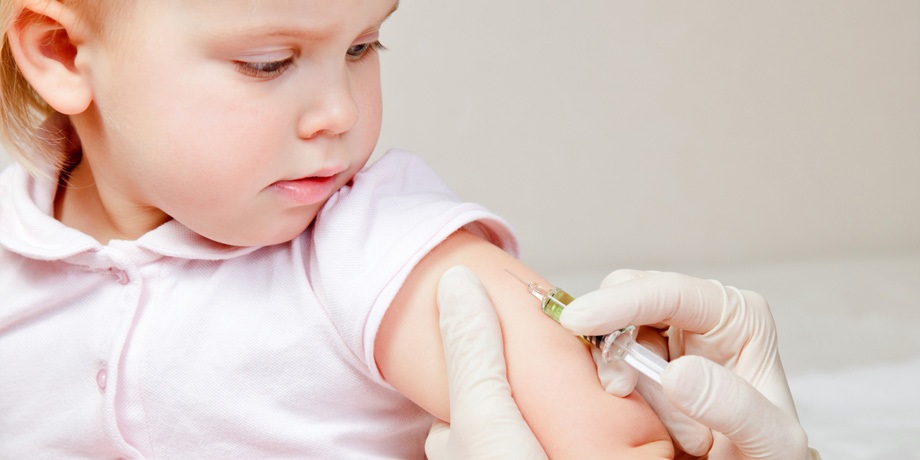
List of vaccinations up to 2 years
Children under 2 years of age are performed by revaccinated stages that were made earlier. This is necessary to create a crumb of persistent immunity to serious infectious viruses.
The entire complete list of vaccinations is up to 2 years and the terms of their conduct can be found in the national table.
Russian vaccination calendar for children under 3 years old
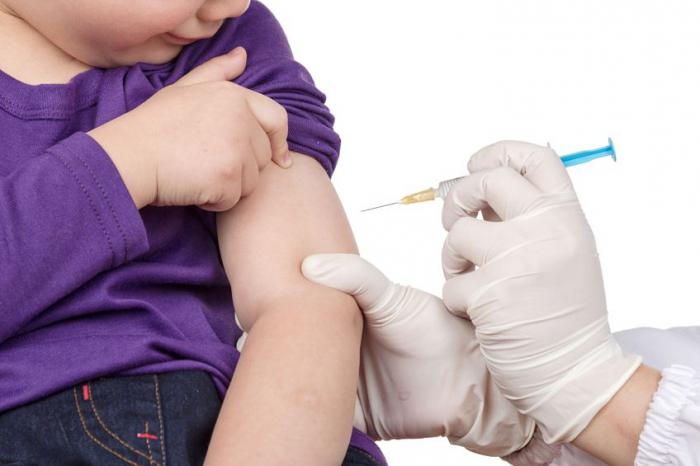
Russian vaccination calendar for children under 3 years old
Children from 2 to 3 years old are performing a revaccination of vaccinations, which were carried out up to a year. At this age, children are already visiting a kindergarten, so the child can be vaccinated in the medical office of a preschool institution.
The full calendar of vaccination of Russia for children under 3 years old see the table above.
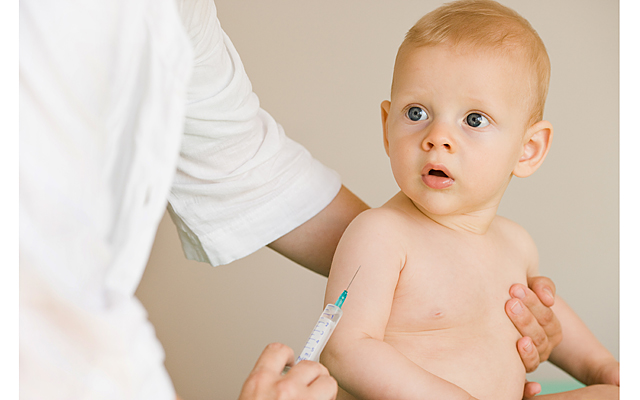
Vaccination calendar up to 3 years
Mandatory vaccinations for children
The national vaccination calendar was approved by order of the Ministry of Health of Russia No. 229 of June 27, 2001. Mandatory vaccinations for children are carried out against such diseases:
- Tuberculosis - bacterial infection that affects various internal organs, most often lungs
- Hepatitis B - infection that affects the liver. Acquires a chronic form, which eventually leads to cirrhosis of the liver
- Polio - infection, virus. Accompanied by the formation of paralysis of irreversible nature
- Diphtheria - infectious disease that affects the lungs, trachea, nervous system, heart muscle, adrenal glands
- Whooping cough - an infection that is accompanied by a strong cough with attacks
- Tetanus - This infection affects the central nervous system, as a result of which a convulsive state or suffocation may occur
- Measles - a virus that occurs with symptoms of intoxication (high body temperature, chills), rash and damage to the nasal mucosa and throat. Heavy complications may appear
- Rubella - a virus manifested by a rash and an increase in lymph nodes
- Small - Acute disease with damage to the salivary glands and nervous system. Boys can be affected by testicles, which leads to infertility
Calendar of vaccination Kazakhstan

Calendar of vaccination Kazakhstan year
In Kazakhstan, children are instilled from the same diseases as in Russia. But in this country its own calendar and its established vaccination periods.
Full calendar of vaccination Kazakhstan:
| The dates of the vaccine | From the tube culesa |
From a hep titus c |
Pro Tiva Polio mie Lita |
Against COC lyusha, Dift RII and POLID nyak (ADD) |
From Dif Teria and pillar nyak (ADS) |
Against Dif Teria (AD-M) |
From Dif Teria And a pillar nyak (ADS-M) |
Pro Tiva Corey |
Pro Tiva steam Titus |
From red nukhi |
| The first Days Life |
+ | + | + | |||||||
| Two months | + | + | + | |||||||
| Three months | + | + | ||||||||
| Four months |
+ | + | + | |||||||
| 12-15 months |
+ | + | ||||||||
| 18 months |
+ | |||||||||
| 6 years | + | + | + | + | + | |||||
| 12 years | + | + | ||||||||
| 15 years | + | |||||||||
| 16 years | + | |||||||||
| Each 10 years |
+ |
Vaccination calendar Ukraine year
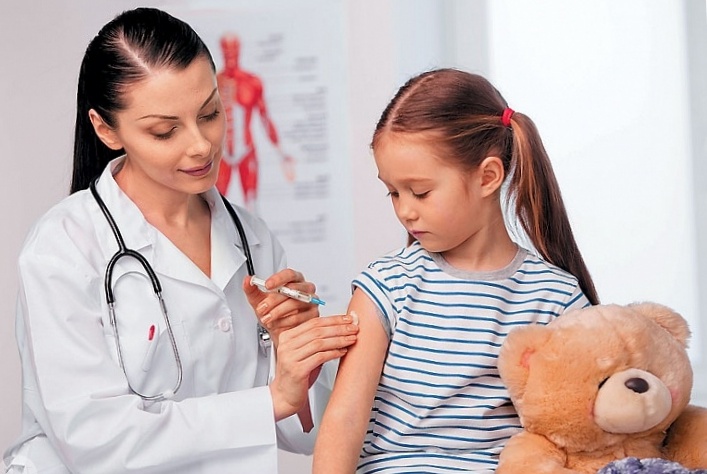
Vaccination calendar Ukraine year
Sanitary doctors of Ukraine annually submit for approval the revised points of the national vaccination calendar for children and adults.
Full vaccination calendar Ukraine:
| The term of immunization |
From the tube Culesa |
Against hepatitis B. | From pertussis, diphtheria and tetanus | From Polio Myelitis |
Against hemo Philic infection |
From measles, rubella and mumps | Dif Teria, pillar nyak |
| 1 day | + | ||||||
| 3-5 days | + | ||||||
| 1 month | + | ||||||
| 2 months | + | + | + | ||||
| 4 months | + | + | + | ||||
| 6 months | + | + | + | ||||
| 12 months | + | + | |||||
| 18 months | + | + | |||||
| 6 years | + | + | + | ||||
| 7 years | + | ||||||
| 14 years | + | ||||||
| 16 years (and further every 10 years) | + |
Is there a new vaccination in the vaccination calendar?
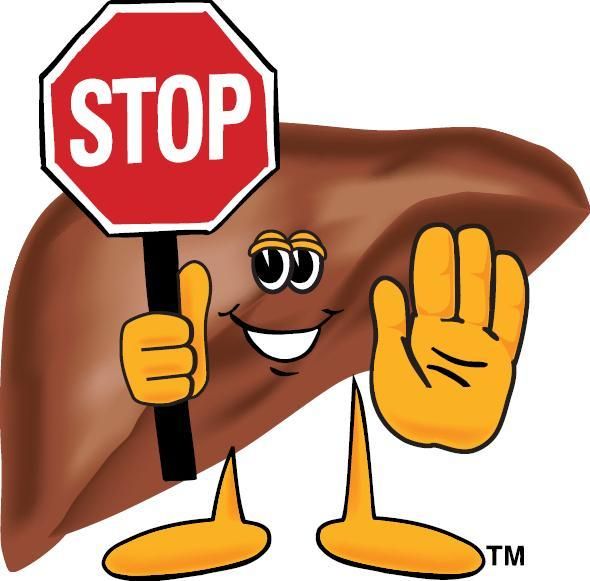
Is there a new vaccination in the vaccination calendar?
Many mothers and dads are incredulous to new vaccines. Fears immediately appear: whether the vaccine has been checked and what contraindications are there.
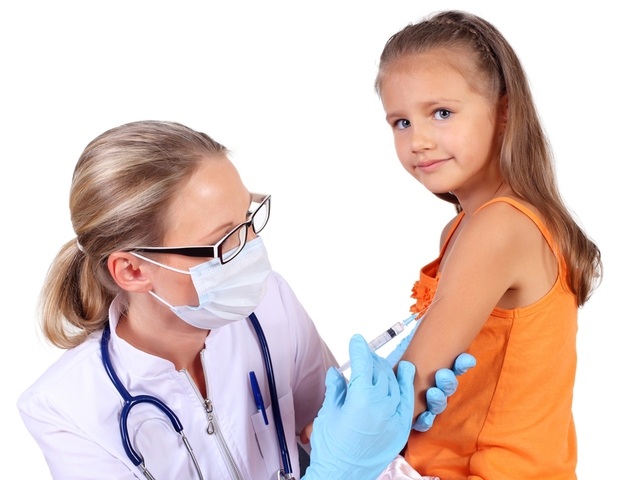
Vaccination calendar
As mentioned above, the decision to conduct a particular vaccination is made by the Council of Specialists in the Ministry of Health. If disappointing forecasts for the epidemiological condition for this disease were made, then a decision is made to introduce new vaccination.
In 2016, a new hepatitis B vaccine appeared, which is spent on children from the first days of life to 18 years old.

